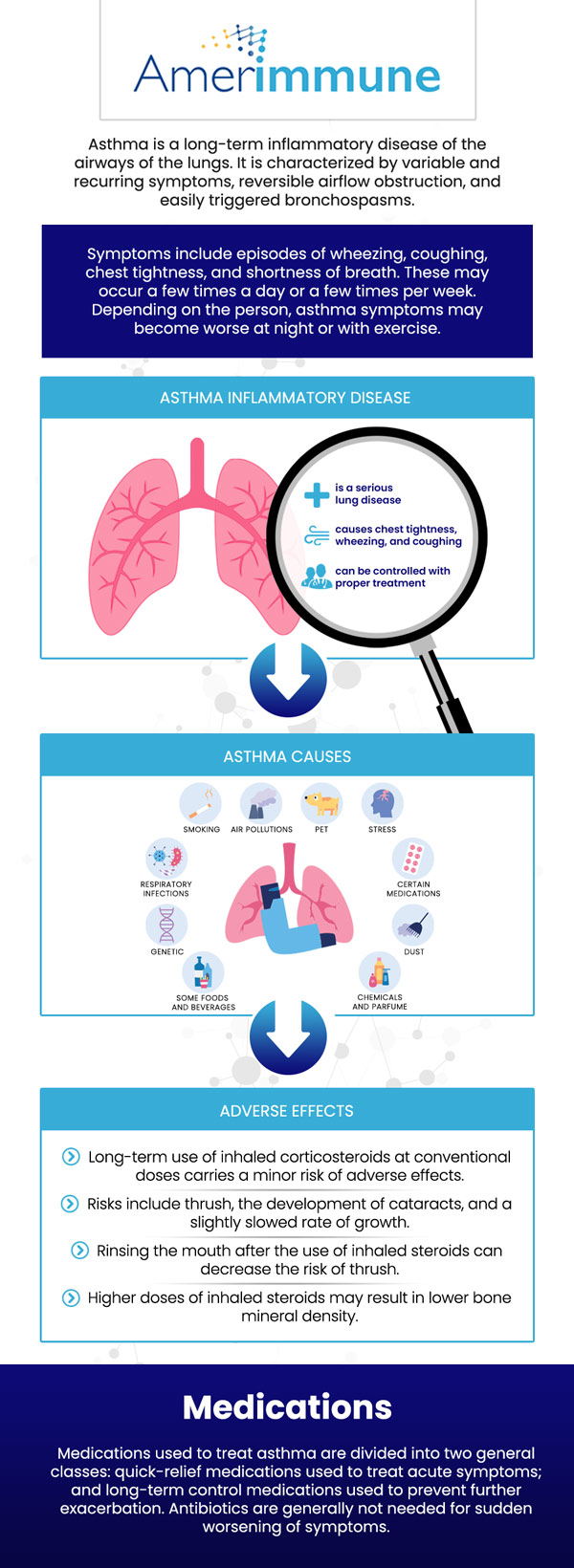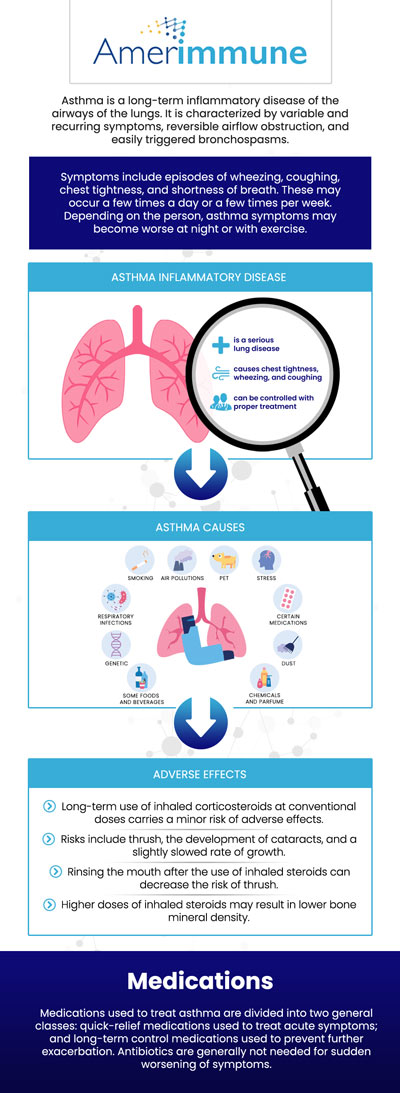Asthma Treatment Specialist in McLean VA, Arlington VA, Alexandria VA, Bethesda MD, and Gaithersburg MD
At Amerimmune Clinic, we specialize in providing comprehensive asthma treatment to help manage your symptoms and improve your quality of life. Dr. Oral Alpan, MD, and his experienced team offer personalized care plans tailored to your specific needs. For more information, contact us or appointment online. We have convenient locations to serve you in McLean VA, Alexandria VA, Arlington VA, Bethesda MD, and Gaithersburg MD.


Table of Contents:
What are the common symptoms of asthma?
What triggers can cause an asthma attack?
How is asthma diagnosed by immunologists?
What steps should be taken during an asthma flare-up?
Asthma is a chronic respiratory condition characterized by inflammation and narrowing of the airways, leading to breathing difficulties and reduced quality of life. At Amerimmune Clinic, our specialists are dedicated to helping patients identify and manage asthma effectively. Individuals affected by asthma typically experience symptoms such as shortness of breath, chest tightness, persistent coughing (especially at night or early morning), and wheezing—a whistling sound during exhalation.
Symptoms can vary significantly in frequency and intensity among patients, often triggered or worsened by factors including allergens, respiratory infections, physical activity, cold air, environmental irritants, or stress.
Additionally, some people experience acute events known as asthma flare-ups or attacks, episodes in which symptoms intensify dramatically and breathing becomes extremely difficult. Amerimmune Clinic emphasizes patient education and proactive care strategies to recognize early signs, prevent severe episodes, and maintain optimal respiratory and immune system function.
At Amerimmune Clinic, we recognize that asthma attacks, known clinically as asthma exacerbations, are closely linked to the immune system and its responses to various environmental and internal factors. Our approach emphasizes understanding your individual immune sensitivities and environmental triggers to offer personalized asthma care.
Common Immune-Related Asthma Triggers
Respiratory infections such as the common cold, influenza, or sinus infections can significantly impact your immune health, causing inflammation and irritation in your airways, thus triggering asthma symptoms.
Immune responses to allergens—such as pollen, dust mites, pet dander, mold spores, and cockroach droppings—can lead to increased airway inflammation and acute exacerbations. We offer advanced allergy testing and immunological assessments to pinpoint your specific triggers and develop targeted treatment plans.
Environmental Factors and Irritants
Exposure to irritants, including tobacco smoke, air pollutants, strong odors from perfumes or cleaning products, and chemical fumes, can negatively affect your respiratory health and trigger asthma symptoms. Our specialists provide guidance on minimizing exposure to these irritants and recommend immune-supportive therapies to improve your respiratory health.
Asthma and Physical Activity
Physical exertion, especially vigorous exercise or activities performed in cold, dry air, may lead to exercise-induced asthma symptoms in susceptible individuals. Our team can help you develop personalized strategies to maintain active lifestyles safely and effectively.
Sensitivity to Weather Changes
Weather fluctuations, such as extreme cold, high humidity, sudden temperature changes, and thunderstorms, can trigger asthma flare-ups. At Amerimmune Clinic, we advise patients on preventive measures and immune-supportive approaches to minimize weather-related asthma symptoms.
Medication and Gastrointestinal Factors
Certain medications—including nonsteroidal anti-inflammatory drugs (NSAIDs), aspirin, and specific beta-blockers—can provoke asthma attacks in sensitive individuals. Additionally, gastrointestinal conditions such as Gastroesophageal Reflux Disease (GERD) may contribute to asthma symptoms by irritating airways through acid reflux. Our providers carefully assess medication use and gastrointestinal health, recommending appropriate therapies to reduce asthma exacerbations.
Understanding and identifying your unique asthma triggers is essential for effectively managing your condition and improving your quality of life. At Amerimmune Clinic, we specialize in comprehensive immune and respiratory assessments to develop personalized strategies designed to minimize asthma attacks and enhance overall respiratory health.
The asthma diagnosis process at Amerimmune Clinic begins with an in-depth consultation, including a thorough review of your medical history, symptoms, symptom frequency and severity, potential allergen or irritant triggers, family history of respiratory conditions, and your previous responses to asthma medications. This detailed evaluation helps our specialists differentiate asthma from other respiratory disorders and tailor precise treatment strategies to your individual needs.
Following your initial consultation, our immunologists typically conduct advanced lung function assessments, such as spirometry. Spirometry measures airflow in and out of your lungs, identifying airway obstruction patterns indicative of asthma. Additionally, we may administer a bronchodilator medication to determine whether your lung function significantly improves afterward, further confirming an asthma diagnosis.
At Amerimmune Clinic, we also specialize in identifying allergic triggers that can exacerbate asthma symptoms. We offer comprehensive allergy testing, including skin prick tests and precise blood tests designed to measure specific IgE antibodies. These tests help identify sensitivities to common allergens such as pollen, mold, dust mites, pet dander, and certain foods, enabling us to create effective allergen avoidance strategies and personalized immunotherapy plans.
In certain cases, our specialists may recommend advanced airway responsiveness assessments, such as methacholine challenge testing. Methacholine is inhaled under controlled conditions, causing mild airway constriction in individuals with asthma. A positive test helps confirm the diagnosis and assists in developing an effective, targeted treatment strategy.
At Amerimmune Clinic, we understand the importance of effectively managing asthma flare-ups and ensuring optimal respiratory health. During an asthma flare-up, it is essential to remain calm and take immediate steps to manage your symptoms. Begin by sitting upright, as this posture helps enhance breathing efficiency. Use your quick-relief inhaler—typically containing a bronchodilator such as albuterol—carefully following the personalized instructions provided by your Amerimmune Clinic healthcare provider. If symptoms persist or worsen rapidly even after using your inhaler, seek immediate medical attention.
Recognizing early signs of an asthma flare-up, including increased coughing, wheezing, shortness of breath, chest tightness, or reduced effectiveness of medications, is crucial. Monitor your breathing closely, and if you have been provided with a peak flow meter, use it to measure your airflow and determine the severity of your symptoms.
If your quick-relief medication does not alleviate symptoms or if symptoms escalate, promptly call emergency services or head to the nearest emergency department. While awaiting medical assistance, continue taking slow, controlled breaths and remain as calm as possible, as anxiety can further complicate respiratory function.
Following an asthma episode, appointment at Amerimmune Clinic to review and update your personalized asthma management plan. Our healthcare professionals will evaluate your current medications, recommend preventive strategies, and adjust your treatment plan to reduce the likelihood of future flare-ups. At Amerimmune Clinic, your respiratory health and overall well-being are our top priorities. For more information, contact us or appointment online. We serve patients from McLean VA, Alexandria VA, Arlington VA, Bethesda MD, Gaithersburg MD, Vienna VA, IdylWood VA, Lincolnia VA, Groveton VA, Falls Church VA, North Bethesda MD, Takoma Park MD, Montgomery Village MD, Redland MD, Aspen Hill MD, and surrounding areas.

Additional Services You May Need
▸ Allergy Consultation
▸ Immunology Consultation
▸ Allergen Immunotherapy
▸ Allergy Vials
▸ Allergy Shots
▸ Biological Drug Administration
▸ Diagnostic Testing
▸ Skin Prick Testing
▸ Allergy Patch Testing
▸ Oral Food Challenge Testing
▸ Nasal Swab Culture Testing
▸ Phlebotomy
▸ Telehealth
▸ Immunology Testing
▸ Food Allergy Testing
▸ Asthma

Additional Services You May Need
▸ Allergy Consultation
▸ Immunology Consultation
▸ Allergen Immunotherapy
▸ Allergy Vials
▸ Allergy Shots
▸ Biological Drug Administration
▸ Diagnostic Testing
▸ Skin Prick Testing
▸ Allergy Patch Testing
▸ Oral Food Challenge Testing
▸ Nasal Swab Culture Testing
▸ Phlebotomy
▸ Telehealth
▸ Immunology Testing
▸ Food Allergy Testing
▸ Asthma

